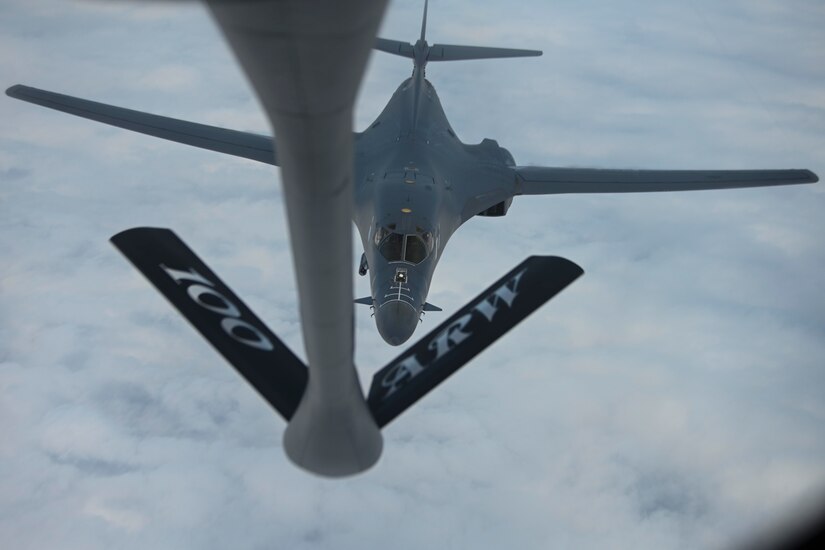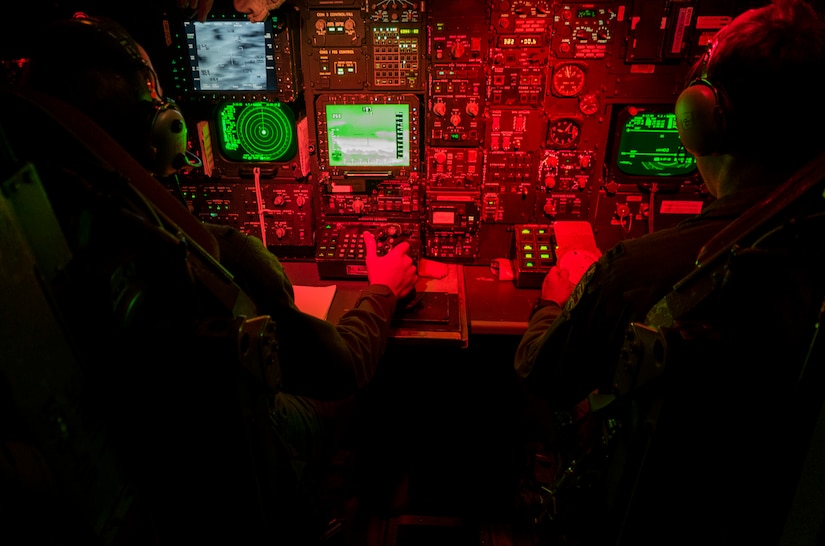Marines prepare to enter a building during urban operations training at Marine Corps Base Camp Pendleton, Calif., April 27, 2021.
Providing up-to-date information, news and original content on American Military issues.
Marines prepare to enter a building during urban operations training at Marine Corps Base Camp Pendleton, Calif., April 27, 2021.
Air Force Senior Airman Joseph Serrano, medical technician assigned to the 88th Inpatient Squadron, 88th Air Base Wing, unpacks safety needles that are used in syringe assembly at the state-led, federally-supported Ford Field Community Vaccination Center in Detroit, April 22, 2021. U.S. Northern Command, through Army North, remains committed to providing continued, flexible Defense Department support to the Federal Emergency Management Agency as part of the whole-of-government response to COVID-19.
Arizona National Guard soldiers and airmen work alongside civilians distributing groceries to local citizens at a food bank in Tucson, Ariz., April 14, 2021. Arizona National Guardsmen continue to support community needs all over the state during the state of emergency response.
Army Spc. Noah Lamoureux, a combat medic assigned to the 62nd Medical Brigade, documents how many doses of the COVID-19 vaccine his team has administered in a 30-minute period at the Yakima Community Vaccination Center, Yakima, Wash., April 19, 2021. U.S. Northern Command, through Army North, remains committed to providing continued, flexible Defense Department support to the Federal Emergency Management Agency as part of the whole-of-government response to COVID-19.
The aircraft carrier USS Dwight D. Eisenhower arrives in Souda Bay, Greece, March 20, 2021, for a scheduled port visit.
Air Force Airman 1st Class Jordyn Eubanks shows Grayson, a military child, how to don aircrew flight equipment during a military child appreciation event at Ellsworth Air Force Base, S.D., April 17, 2021.
Sailors oversee the movement of a Marine Corps MV-22 Osprey aboard the USS Makin Island in the Pacific Ocean, April 24, 2021.
U.S. and Uzbekistani Special Forces conduct training operations during Southern Strike in Meridian, Miss., April 25, 2021. The annual exercise is designed to increase combat readiness.
Airmen refuel an Air Force KC-10 and four F-15s during Nexus Dawn over Travis Air Force Base, Calif., April 27, 2021. The exercise is designed to test airmen’s ability to generate, employ and sustain air operations in a simulated combat environment.
Marines conduct helicopter support team operations during a weapons and tactics instructor course near Yuma, Ariz., March 29, 2021.
April 29, 2021
The Department of Defense announced today the expansion of access to military exchanges.
Starting May 1, 2021, DOD and Coast Guard appropriated fund and nonappropriated fund civilian employees are authorized to shop at military exchange stores in the United States and the U.S. territories and possessions. Online exchange access will also be available for active and retired DOD and Coast Guard appropriated fund and nonappropriated fund civilian employees by mid-October. This shopping access does not include the purchase of military uniforms, tobacco products or alcohol.
Previous in-store exchange access for DOD and Coast Guard civilian employees was limited to those on service agreements overseas (i.e., in foreign countries and the U.S. territories and possessions) and access was limited to overseas exchanges. The expansion will allow all DOD and Coast Guard civilian employees to shop in exchange stores in the United States and the U.S. territories and possessions.
“Every shopper of the exchange helps improve the military community and the benefit for service members and their families,” said Patricia “Patty” Montes Barron, deputy assistant secretary of defense for military community and family policy. “We welcome our DOD and Coast Guard civilian employees to take advantage of the convenience and familiarity of military exchanges. Shopping at our military exchanges is a quality of life experience that serves the community in ways no other commercial entity does.”
Online exchange access will be available later this year for all active and retired DOD and Coast Guard civilian employees with a U.S. mailing address, including territories and possessions and APO and FPO addresses. Online exchanges are not permitted to ship to local addresses in foreign countries.
To learn more about military exchange access, visit the commissaries and exchanges webpage on the Military OneSource website.
About Military Community and Family Policy
Military Community and Family Policy is directly responsible for establishing and overseeing quality-of-life policies and programs that help our service members, their families and survivors be well and mission-ready. Military OneSource is the gateway to programs and services that support the everyday needs of the 5.2 million service members and immediate family members of the military community. These Department of Defense services can be accessed 24/7/365 around the world.
Paul Martinez, a heavy equipment operator assigned to the 60th Aerial Port Squadron, moves oxygen tanks in a warehouse at Travis Air Force Base, Calif., April 27, 2021. The United States, through the U.S. Agency for International Development, donated 440 oxygen cylinders and regulators, 1 million N95 masks and 1 million COVID-19 rapid diagnostic kits to help India fight COVID-19.
Airman 1st Class Fernando Beltran, a cargo specialist assigned to the 60th Aerial Port Squadron, secures oxygen cylinders to a pallet in a warehouse at Travis Air Force Base, Calif., April 28, 2021. The United States, through the U.S. Agency for International Development, donated 440 oxygen cylinders and regulators, 1 million N95 masks and 1 million COVID-19 rapid diagnostic kits to help India fight COVID-19.
Air Force Senior Airman Miranda Petti, a passenger representative assigned to the 8th Expeditionary Air Mobility Squadron, helps palletize luggage for a flight at Al Udeid Air Base, Qatar, March 19, 2021.
April 29, 2021 | BY David Vergun , DOD News
Russian influence and meddling in nations around the Mediterranean and the Middle East have been characterized as destabilizing and opportunistic and pose concerns for regional security and stability, according to a Defense Department official.
Laura K. Cooper, deputy assistant secretary of defense for international security affairs for Russia, Ukraine, Eurasia, said that as Russian influence and military capability in the region grow, allies and partners — particularly NATO — become incredibly important in holding Russia accountable.

"We are determined to impose costs for Russia's destabilizing behavior," Cooper told an Atlantic Council panel.
"The way that the U.S. is approaching security cooperation is through developing very long-term strategic partnerships that involve training and education and operations that we work on together. This approach is quite fundamental to all of the allies and partners of the region," she said.
Cooper noted that the U.S. is not seeking to escalate tensions. "And we are seeking to have a more stable relationship with Russia, so this inevitably involves dialogue."
Cooper said it's important to watch Russia's actions, rather than just to listen to its words. Noting that Russia has agreed to remove its forces from Libya, she said the U.S. is waiting to see what happens. "We will be watching closely to see if that actually occurs," she said.

"From a policy perspective, we have to be measured and realistic about the actual impact of those transactional relationships," she said.
Russia has appeared from time-to-time to play the role of peacemaker in the region, but that isn't really fooling anyone, she said. "I think countries of the region recognize how much this is to burnish Russia's image, and how, in many cases, prolonging instability and prolonging conflict actually suits Moscow's goals," Cooper said.
"So, I think we have to give some credit to our allies and partners and their ability to be clear-eyed about this," she continued.
For example, Cooper noted that there is an inherent tension between Russia's desire to support a relationship with Iran and at the same time to cozy up to Arab countries and Israel. "This inherent tension is not lost on any of the parties in the region. And so I think that's really important at the outset. We don't want to overhype the influence or overhype the threat. That's where we're really clear in our conversations with allies and partners about situations in which Russia's military-to-military cooperation, in particular, does impact our relationship," she said.
For example, the sale of a Russian S-400 air defense system to Turkey resulted in a clear and decisive action on the part of the United States in removing Turkey from the F-35 advanced aircraft program, she said.

That being said, Turkey remains an important NATO ally and removal of the F-35 program was an example of a measured, balanced and tailored approach, she said.
Cooper said that the strong U.S. military presence in the Mediterranean region will continue as it has for many decades. "That is something that, perhaps, we take for granted, but it's an important source of our ability to protect our national security interests and also to cooperate as part of the NATO alliance."
The other piece is U.S. investments in humanitarian assistance in the region, which completely dwarfs anything that Russia is doing in that space, she said.
For example, in Syria, the U.S. has been working with the United Nations to invest in reconstruction and humanitarian assistance, while Russian actions in this regard have been to line the pockets of cronies in the Kremlin, she said.
Army Capt. Mathew Schmidt helps remove weeds at Zama Yatoyama Park during an Earth Day event near Camp Zama, Japan, April 22, 2021.
Recruits wait to receive a voluntary COVID-19 vaccination in the Pacific Fleet Drill Hall at Recruit Training Command, Great Lakes, Ill., April 26, 2021. The event, a collaboration with medical staff from the Captain James A. Lovell Federal Health Care Center and Recruit Training Command, gave 180 recruits an opportunity to receive the vaccine. More than 40,000 recruits train annually at the Navy's only boot camp.
Army Capt. Shayna Taylor guides the driver of an M2/A2 Bradley Fighting Vehicle during training in Yanbu, Saudi Arabia, April 20, 2021.
April 29, 2021
Secretary of Defense Lloyd J. Austin III announced today that the president has made the following nominations:
Capt. Dennis E. Collins has been nominated for appointment to the rank of rear admiral (lower half). Collins is currently serving as officer in charge, Navy Reserve, U.S. Indo-Pacific Command, Detachment 401, Camp H.M. Smith, Hawaii.
Capt. Bradley D. Dunham has been nominated for appointment to the rank of rear admiral (lower half). Dunham is currently serving as chief of staff, Navy Reserve, U.S. Fleet Forces Command, Norfolk, Virginia.
Capt. Mark F. Haigis has been nominated for appointment to the rank of rear admiral (lower half). Haigis is currently serving as commanding officer, Navy Reserve, Naval Leadership and Ethics Center, Newport, Rhode Island.
Capt. Scott W. Ruston has been nominated for appointment to the rank of rear admiral (lower half). Ruston is currently serving as deputy commander, Navy Region Southwest Reserve Component Command, San Diego, California.
Capt. Douglas W. Sasse III has been nominated for appointment to the rank of rear admiral (lower half). Sasse is currently serving as commanding officer, Navy Reserve, Fourth Fleet, Mayport, Florida.
Capt. Michael J. Schwerin has been nominated for appointment to the rank of rear admiral (lower half). Schwerin is currently serving as commanding officer, Navy Reserve, Officer Training Command, Newport, Rhode Island.
Capt. David R. Storr has been nominated for appointment to the rank of rear admiral (lower half). Storr is currently serving as manager, Navy Reserve, Rapid Research and Development Detachment, Patuxent River, Maryland.